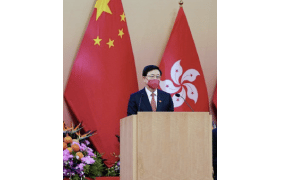National security legislation mandated by Article 23 of the city’s mini-constitution, the Basic Law, was conspicuously absent from a list of bills to be presented to the Legislative Council (LegCo) by the end of the year, after appearing in a similar list in January 2022.
Hong Kong chief executive John Lee, who vowed on taking office to press ahead with more “effective” security laws, told reporters that the government needs more time to study the exact form such laws should take.
“In terms of legal research, we need to conduct an in-depth and comprehensive review of possible methods, in the light of recent changes in the international situation,” Lee said.
“We don’t want to make a law that contains loopholes and then have to revise it, so we need to carry out sufficient and comprehensive legal research.”
“The most important thing is that the law we make is truly effective,” Lee said, citing rapid geopolitical changes as a factor in the decision.
He said among measures being considered were those targeted people deemed a potential threat to national security, including “preventing them from leaving somewhere,” or subjecting them to “repeated bans.”
Concerns over travel bans being used to prevent people from leaving Hong Kong first emerged in 2021, when the government amended the city’s immigration laws to enable security chiefs to ban passengers from taking any form of transport in or out of the city.




